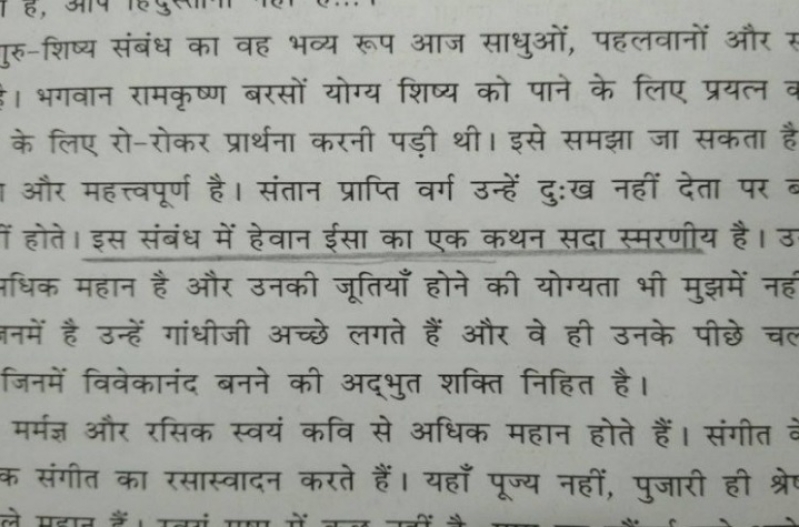
Christian groups in India are in an uproar over a Hindi textbook that calls Jesus a "demon."
The textbook was published by the Gujarat State School Textbook Board (GSSTB) last year for Class IX pupils, but hasn't been edited until now.
The text in question is found in chapter 16, page 70, of the book 'Bharatiya Sanskriti Mein Guru-Shishya Sambandh' (Relationship Between a Guru and His Disciples in Indian Culture) written by Anandshankar Madhavan.
It says, "Iss sambandh me hevaan Isa ka ek kathan sada smarniya hai (In this context one anecdote of demon Jesus is very memorable)," according to News 18.
The error was noticed by advocate Subramania Iyer. He said it invites section 295 (a) of the Indian Penal Code, which refers to "Deliberate and malicious acts, intended to outrage religious feelings or any class by insulting its religion or religious beliefs."
The section says, "Whoever, with deliberate and malicious intention of outraging the religious feelings of any class of citizens of India, by words, either spoken or written, or by signs or by visible representations or otherwise, insults or attempts to insult the religion or the religious beliefs of that class, shall be punished with imprisonment of either description for a term which may extend to three years, or with fine, or with both."
Iyer said the text portrays Jesus as a demon to the students, which is an "unacceptable" error that must be rectified right away. Although he acknowledged the error could have been committed unintentionally, he warned it could "create a rift" among the people and cause problems.
"Jesus is being portrayed as a demon to students. Quite clearly, this is a case that attracts section 295(a) of the IPC that pertains to hurting the religious sentiments of any class," Iyer told News 18. "This simply is unacceptable and should be removed immediately."
The Christian community in Gujarat staged a protest outside the office of the District Education Officer on Friday, demanding that the textbook be pulled out immediately and that the entire chapter where the controversial line was found be removed completely from the book, The Indian Express reported.
They also demanded a written and published public apology from the Gujarat government.
Nitin Pethani, chairman of the GSSTB, explained the mistake was a typographical error.
"The word "haiva", a disciple of Jesus Christ, got misprinted as "haivan", meaning a demon," he told News 18.
Furthermore, "Aadam Isa" and "Haiva Isa" were the two disciples of Christ and an "n" inadvertently got printed in the book, he said.
Pethani said an internal inquiry will be conducted regarding the matter. However, the book will not be withdrawn from the schools.
The board's solution to address the problem now is to hand an adivsory to teachers to make them aware of the error when they use the book in class, the Hindustan Times reported.
"We have already made the correction in the online version," he said. "Since books have already been distributed among students, it is not possible to withdraw them now."
"To make sure that the corrected version is taught to students, we will issue a written advisory to all the teachers, asking them to take into account this correction while teaching this subject."
The Gujarat State School Textbook Board is known to have previously published books with erroneous information, such as one that gave the wrong date for Mahatma Gandhi's death anniversary, and another one that claimed Japan dropped an atomic bomb on the U.S. during World War II.
Fr Vinayak Jhadav, spokesperson of the Catholic Church of Gujarat, said they pointed out the error to the GSSTB chairman a month ago and requested immediate correction, according to India Times.
Thomas Macwan, archbishop of Gandhinagar and president of All Gujarat United Christians Forum, said the textbook error hurt the sentiments of the Christian community and asked the authorities to ensure no such mistake gets repeated.
"We have expressed that our sentiments have been hurt by what is written but it could be a mistake. We would like to say that religious sentiments are hurt and to make sure this is not repeated next year," Macwan said. "We would want things to be clarified. The Bible has not been quoted properly as well."
Likewise, the Indian Christian Voice (ICV) said the religious sentiments of both Christians and Muslims were "deeply hurt" by the textbook's reference to Jesus as "demon."
"We demand criminal action against the perpetrators and an unconditional apology from the state government," ICV President Abraham Mathai told IANS.
Mathai, like the other Christian leaders protesting the textbook error, said the book should be pulled out from schools and re-issued when the necessary corrections have been made.
He also asked the state government to affirm the religious minority that it is committed to protecting them.
"Such wild and reckless statements have the potential to spark off a conflagration that could seriously jeopardise communal harmony. In the larger interest of peace, this particular edition of the book must be withdrawn and banned immediately," Mathai said.






